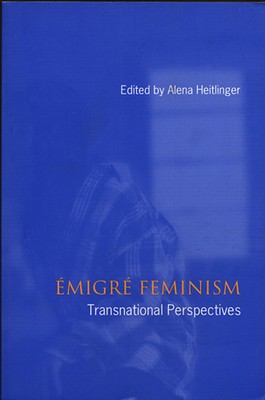
- We will send in 10–14 business days.
- Publisher: University of Toronto Press
- ISBN-10: 0802078990
- ISBN-13: 9780802078995
- Format: 16.3 x 22.8 x 2.4 cm, softcover
- Language: English
- SAVE -10% with code: EXTRA
Emigre Feminism (e-book) (used book) | bookbook.eu
Reviews
Description
Bringing together the views of expatriate, exiled, and emigre feminists from various parts of the world, this collection explores themes of exile, home, displacement, and the practice of feminism across national boundaries.
The thirteen articles presented here originated with a conference on emigre feminism held at Trent University in October 1996. The authors, most of them now living in Canada, are scholars from South Africa, Chile, Trinidad and Tobago, Greece, Hungary, the Czech Republic, Turkey, Iran, Finland and New Zealand. Their views have been shaped by their experience of specific political and economic changes, such as the dismantling of communism or apartheid, the rise of religious fundamentalism, or rapid marketization. Together the essays offer a rich diversity of intellectual, political, cultural, and religious perspectives.
This book adds a new dimension to our understanding of expatriation by putting a feminist face on the emigre experience.
EXTRA 10 % discount with code: EXTRA
The promotion ends in 17d.18:18:22
The discount code is valid when purchasing from 10 €. Discounts do not stack.
- Publisher: University of Toronto Press
- ISBN-10: 0802078990
- ISBN-13: 9780802078995
- Format: 16.3 x 22.8 x 2.4 cm, softcover
- Language: English English
Bringing together the views of expatriate, exiled, and emigre feminists from various parts of the world, this collection explores themes of exile, home, displacement, and the practice of feminism across national boundaries.
The thirteen articles presented here originated with a conference on emigre feminism held at Trent University in October 1996. The authors, most of them now living in Canada, are scholars from South Africa, Chile, Trinidad and Tobago, Greece, Hungary, the Czech Republic, Turkey, Iran, Finland and New Zealand. Their views have been shaped by their experience of specific political and economic changes, such as the dismantling of communism or apartheid, the rise of religious fundamentalism, or rapid marketization. Together the essays offer a rich diversity of intellectual, political, cultural, and religious perspectives.
This book adds a new dimension to our understanding of expatriation by putting a feminist face on the emigre experience.


Reviews